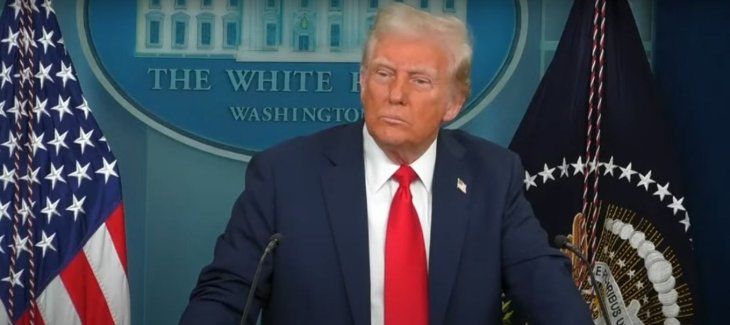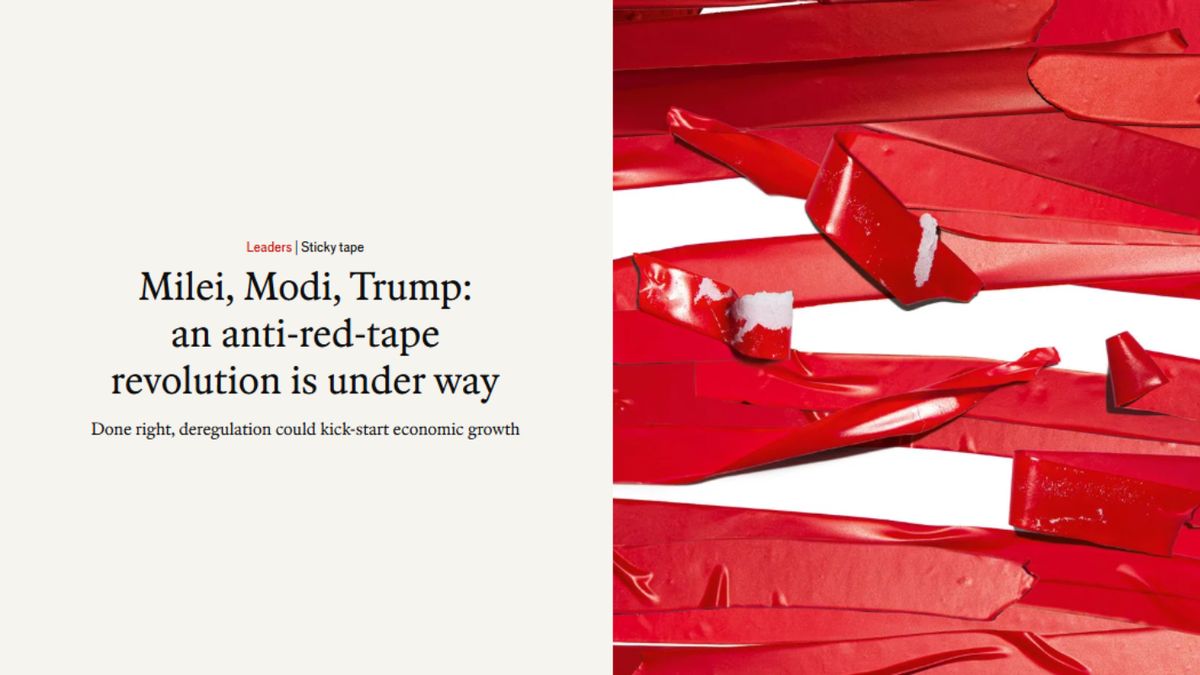British weekly publication The Economist He dedicated his lid to the president of Argentina again, Javier Milei, When focusing on the Dregulation worldwide. The weekly titled its publication as “TOn anti -red-tape revolution is under way ” (“A revolt against bureaucracy is underway“), And the libertarian be spent within with the US president Donald Trump And the Indian Prime Minister Narendra Modi.
The Economist chose the three figures as leaders who drive a drastic reduction in state regulations, while in a timely man, said that “Milei has wielded a chainsaw against the Argentine regulations”while placing it as a model that other heads of state could follow.
November 2023: Milei’s last cover in The Economist
This is not the first time that the British media chooses to put Milei on its lid, since it had done the same in November 2023, a few days after the ballot that took him to the Rivadavia armchair. On that occasion, he had illustrated the cover with an image of the libertarian and the phrase: “My contempt for the State is infinite. What Javier Milei can teach Donald Trump.”
In this publication, it had been pointed out that the then candidate represented a political phenomenon with similarities to Trumpism, but more radical when talking about state reduction.
Cover The Economist Milei 2023.avif
The Economist Cover with Milei in 2023
Milei’s new mention on The Economist’s lid: world -level deregulation
In this latest edition, he dedicated the lid and main note to deregulation as an international trend, being Milei one of the maximum exponents at the global level. “From Buenos Aires and Delhi to Brussels and London, politicians have promised to cut the bureaucratic tangle that suffocates the economy”wrote.
In addition to the Argentine president, he placed Trump, Modi and the British Finance Minister Rachel Reeves like other members of this “revolution” that It seeks to simplify regulations and reduce state intervention in various areas.
In that sense, he pointed out that if it is implemented correctly, “The revolution against bureaucracy could bring greater freedom, faster economic growth, lower prices and new technologies.” That is why he used as an example to the deregulation carried out in Argentina, indicating that “Bajo Milei, Argentina is growing again; deregulation has reduced prices of some imports by up to 35%.”
However, he also explained that an indiscriminate elimination of regulations can bring certain risks. “Trump runs the risk of giving bad reputation to deregulation”since its approach to “demolish essential functions of the government before restoring what you like”, it could bring a negative impact on both society and the economy.
Capture Donald Trump January 30.jpg

For The Economist, “Trump runs the risk of giving bad reputation to deregulation.”
He also said that the problem of over -regulation hinders in much of the cases hinders economic development, since for example “Americans dedicate a total of 12,000 million hours a year to comply with federal regulations, including those on honey marketing and flammability standards of children’s pajamas.”
On the United Kingdom side, The Economist stressed that certain environmental measures raised costs and delayed infrastructure construction. “The well -intentioned rules that protect bats, tritones and rare fungi contribute to obstructing, delaying and more expensive works,” indicates the article.
“Internet ascent means that countries need codes to protect people from online scams; Global warming demands rules to limit carbon emissions “, The British medium explained along that line, which also claimed that confidence in the free market decreased after the global financial crisis.
Then, he argued again: “In much of the developed world, Building anything has become a discouraging task, which keeps housing prices. Even those necessary for the energy transition, almost a decade spend a hell of permits. “
It is by ell that he remarked that, implemented in a strategic and planned way, deregulation can be beneficial, putting as an example Margaret Thatcher in the United Kingdom, the Pro-Mercado de India reforms in the 1990s and recent changes in southern Europe. “All these cases promoted economic growth after the elimination of regulatory barriers,” he added.
“USA You need Milei’s preparation “
As for Argentina, he praised the speed with which Milei implemented the first deregulation measures and stressed that his team “He came to power after having spent 18 months studying how to extract the government from areas where he should not be.”
However, he pointed out that in the case of Trump “If your team persists in indiscriminately cut the State, saying goodbye and freezing federal loans and subsidies with the belief that this will release the economy, it will be making a serious mistake.”
But, in turn, he referred to the reverse risk, that is, the lack of ambition in the reforms. He affirmed that “the danger in Europe is shyness,” and that he cited the International Monetary Fund (IMF), which estimated that “Half of all reforms in electricity and labor market for older workers in the world developed during the last 30 years were never implemented.”
Finally, The Economist remarked that the United States needs detailed planning to carry out regulatory reforms, while Europe needs greater determination to reduce its bureaucracy. “Europe needs the ambition of a ‘government efficiency department’ (Doge), while the United States needs the preparation of Milei”, sentenced.
Source: Ambito
I am an author and journalist who has worked in the entertainment industry for over a decade. I currently work as a news editor at a major news website, and my focus is on covering the latest trends in entertainment. I also write occasional pieces for other outlets, and have authored two books about the entertainment industry.




